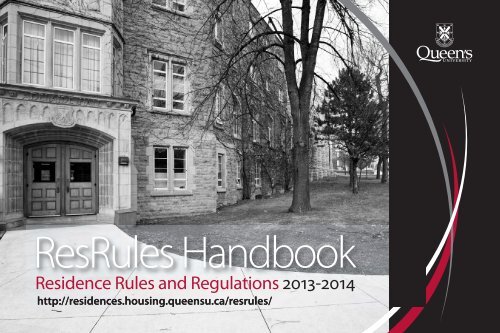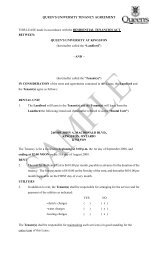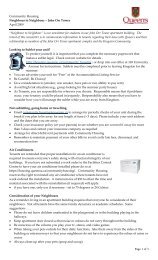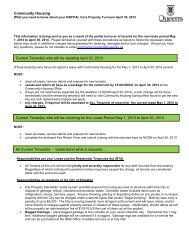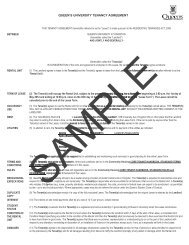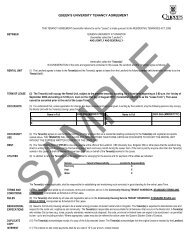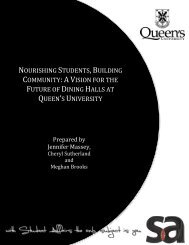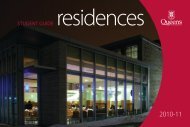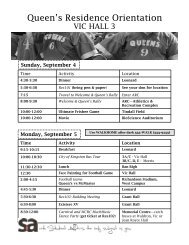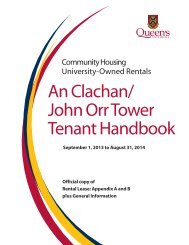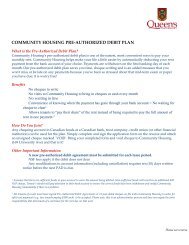Residence Rules Handbook 2013-2014 - Residences - Queen's ...
Residence Rules Handbook 2013-2014 - Residences - Queen's ...
Residence Rules Handbook 2013-2014 - Residences - Queen's ...
- No tags were found...
Create successful ePaper yourself
Turn your PDF publications into a flip-book with our unique Google optimized e-Paper software.
<strong>Residence</strong> Life Philosophy for Res<strong>Rules</strong><strong>Residence</strong> Life structures the Student Conduct Process and our <strong>Residence</strong> <strong>Rules</strong> andRegulations (Res<strong>Rules</strong>) on three principles:1 Res<strong>Rules</strong> are remedial in nature and are therefore designed to educate students ontheir responsibilities and the consequences of their actions.2 The safety and security of every student is the responsibility of everyone in theresidence community.3 <strong>Residence</strong> is a community that values mutual respect of the rights, responsibilities,dignity, wellbeing, and academic pursuits of all members.Goals of Res<strong>Rules</strong>C Encourage students to make safe, healthy andpositive choices and accept responsibility fortheir behaviour.C Provide a respectful, fair, and transparent peerbasedstudent conduct system.C Promote the safety and security of residenceand aid in the protection of personal andresidence property.4
The Queen’s Student Code of ConductAll students are required to adhere to the Queen’s Student Code of Conduct. To view a copy of the Codeof Conduct please refer tohttp://www.queensu.ca/secretariat/disputeresolution/studentcodeofconduct.htmlStudents have a duty to familiarize themselves with the academic and non-academic rules andregulations of the University.Queen’s University retains the right to exercise emergency powers if satisfied that the interest or safetyof other students, staff, faculty, or members of the public would be endangered by the student’scontinued presence at Queen’s University or specific part hereof. The exercise of emergency powers,including the issuance of a Notice of Prohibition, takes effect immediately and is not suspended pendinga hearing.Please note: The Assistant Dean, Student Affairs, (or delegate), is responsible for such steps as arenecessary to ensure the health, safety, and security of all residence occupants and to preserve residenceproperty. Such steps may include the right to reassign a room, temporarily or permanently suspend,or terminate a <strong>Residence</strong> Agreement. The University and <strong>Residence</strong>s reserve the right to amend, alteror add to this information at any time.By accepting the Queen’s offer of admission to residence, you have agreed to abide by thepolicies, rules and regulations of the <strong>Residence</strong>s and Queen’s University.The Res<strong>Rules</strong> and the laws of Canada will be upheld.It should be noted that the possibility of sanctions with the <strong>Residence</strong> Student Conduct Processdo not preclude other processes or sanctions that may be available through the legal system.6
<strong>Residence</strong> RegulationsALCOHOLQueen’s is committed to fostering a campus culture thatendorses healthy, responsible, and low-risk drinkingpractices among students. As the majority of studentsentering residence are underage and all sanctionedOrientation activities are dry/alcohol-free, we have adry/alcohol-free policy in residence during the entireweek of Orientation, from Move-In Day until 8am on thefirst day of undergraduate classes.While many residents choose not to consume alcohol,residents who are 19 years of age or older may responsiblyconsume alcohol in residence (after the first day of classes)so long as they do so in their residence room and inaccordance with the Res<strong>Rules</strong>.NOISEC Quiet Hours occur between the hours of 11 pm to 8 am,Sundays to Thursdays, and from 1 am to 8 am on Fridaysand Saturdays.C Quiet Hours are increased during exam periods. Studentswill be notified when Quiet Hours are increased.C Some floors have altered Quiet Hours. Students arerequired to respect the Quiet Hours in place for thesecommunities.GUESTSThe purpose of the guest policy is to encourage residents to host guests in a responsible manner. Hostingguests is a privilege, not a right. If the guest policy is violated, residents may lose their privilege to host guests.Any violation of the guest policy will result in guests being escorted out of the building and they will berequired to find alternate accommodations outside of residence.C Residents are permitted a maximum of 2 guests at any one time. Any non-resident of a building isconsidered a guest, including residents of other Queen’s residence buildings.C Residents are responsible for their guest’s behaviour during their visit and any Res<strong>Rules</strong> violations theycommit.C Residents are responsible for informing their guests of the <strong>Residence</strong> <strong>Rules</strong> and Regulations. Any fines,damages, etc., incurred by guests will be the responsibility of the host. Guests who are behavinginappropriately will be asked to leave.C Guests are expected to cooperate with requests by all <strong>Residence</strong> and University Staff.C Residents are limited to hosting guests for no more than three consecutive nights. Overnight guests maystay at your discretion; however, your roommate’s consent is required prior to inviting anyone for anovernight stay.C Overnight guests will not be permitted during Orientation Week, from Move-In Day to 8 am onthe first day of undergraduate classes.C Guests will not be permitted during Queen’s Homecoming Weekends, October 4-6, <strong>2013</strong> andOctober 18-20, <strong>2013</strong>.C While in residence buildings, guests must be escorted by their host at all times.C It is at the discretion of <strong>Residence</strong> Life to restrict access to residences by guests and others throughoutthe academic year.7
PROHIBITED ITEMS IN RESIDENCEThere are some items that are restricted in the residences because of the potentialhazard to the health and safety of the community. This list includes but is not limited to:C Glass beer bottles, large containers of alcohol such as kegs, or any alcohol containerexceeding 1 litre.C Large quantities of alcohol exceeding the volume of 24 beer cans, or 12 tall cans, or 26ounces of liquor, or 1 litre of wine, or any container of alcohol exceeding 1 litre.C Items that promote unsafe alcohol consumption (e.g. drinking games or drinkinggame tables, trophy walls, funnels, or any other drinking paraphernalia).C Any illegal substances, unprescribed narcotics, controlled substances, or drugparaphernalia (including hookahs, bongs, pipes, etc.).C Candles including decorative, incense, potpourri burners, fireworks, firecrackers,birthday sparklers and flammable liquids. Items to be used for religious purposesmust be approved by <strong>Residence</strong> Life.C Any item with an open element (e.g. hot plates, toasters, toaster ovens, etc.). Thisincludes the use of personal appliances, such as electric blankets or microwave ovens.<strong>Residence</strong>s reserves the right to inspect, remove or request the removal of cookingappliances or electrical devices.C Hazardous materials such as gasoline, propane tanks, barbecues, fuels, corrosives, orexplosives.C Weapons including large knives, martial arts weapons, firearms, pellet or B.B. guns, orreplica weapons. Items such as kirpans worn for religious purposes are accepted, withpermission from <strong>Residence</strong> Life Management. If you need a weapon for an extracurricularactivity (such as martial arts), please make arrangements to store theweapon outside of residences.8
EVACUATION PROCEDURESC On hearing the fire alarm, you must leave immediately by the nearest exit in an orderly manner.C Do not use elevators during an alarm.<strong>Residence</strong> SafetyIf you discover a fire in residence, do notplace yourself in danger:C close the door to the area;C activate the nearest fire pull station; andC leave the building by the nearest exit.C The University is not responsible for the safety of those who ignore a fire alarm. You not only risk yourown life, but also the lives of firefighters who may have to rescue you.C Be aware of students who may need your assistance in evacuating the building. If you are unable toassist them (e.g., a student in a wheelchair), ensure that you notify a residence staff member or afirefighter of their location.C If you have an accessibility requirement (differing ability, difficulty waking up) that hampers your abilityto evacuate immediately when an alarm sounds, you must notify your Don when you move in.COOKINGC <strong>Residence</strong> common spaces provide space for you to cook. You may not cook in your residence room orin hallways.C Do not leave any cooking unattended, as the sensitive nature of our fire equipment can set off an alarmvery easily.C You are expected to check the cleanliness of any cooking appliance before and after cooking.C You will be held accountable for cooking-caused fire alarms including, but not limited to, responsibilityfor any charge from the City of Kingston Fire Department (currently $300).ELECTRICAL EQUIPMENTC Personal electrical devices in residence should be used with discretion and must be C.S.A. approved(radios, hairdryers, etc.).C <strong>Residence</strong>s reserves the right to inspect, remove, or request the removal of electrical devices.9
YOUR RESPONSIBILITIES REGARDING RESIDENCE SECURITY<strong>Residence</strong> Security<strong>Residence</strong> is committed to keeping allresidents and residence property secure.You are expected to share responsibility for the security of your residence.C Do not allow tailgating (allowing an unknown individual to enter any residence building).C Report suspicious persons to your Don, front desk, or Campus Security.C Keep your door locked and your keys with you at all times.LOCKS, DOORS AND KEYSC Locks and keys are the property of <strong>Residence</strong>s. You are only permitted possession of residencekeys that have been issued to you, by <strong>Residence</strong> Facilities, for the period of time that you livein residence. You may not copy or lend your residence keys.C It is important to carry your keys with you at all times, and even more important to keep yourresidence room locked at all times.C If you lock yourself out of your room, the front desk will escort you to your room and give youaccess. The first time is complimentary; a $10 fee will be charged for each additional time.C Lost or stolen keys must be reported immediately. There will be a replacement fee of $125 plus$10 for the mailbox key. Failure to return your keys when you check out of residence will resultin a replacement charge to your student account.C Malfunctioning locks or lost keys must be reported immediately to your front desk.C Theft of personal property should be reported to your <strong>Residence</strong> Life Coordinator and CampusSecurity. Contact Campus Security non-emergency line at 613- 533- 6733.C Forcing of a locked door is a Level Two Res<strong>Rules</strong> offence and also subject to a damage charge.ROOM ENTRY10<strong>Residence</strong> Staff have the right to enter a resident’s room:C For the purpose of cleaning, maintenance and/or inspection of facilities.C In the event of an emergency, where the health, safety or security of residence or a residentis involved, or when <strong>Residence</strong> or University Staff have reasonable grounds to suspect thatthe Res<strong>Rules</strong> or the laws of the land are being violated; including, but not limited to,possession of weapons, illegal substances, and alcohol.C Notice of such entry will be given in advance, wherever possible.C Submission of a Maintenance Request Order (MRO) constitutes permission to enter your room.
INSURANCEC Insurance carried by the University does not cover personal possessions of students and theUniversity does not assume any liability for lost, stolen or damaged items of personal property,no matter how caused.C All valuables should be kept under lock and key, and you are advised to keep your room lockedat all times. You may want to consider alternate secure storage for particularly valuable items.C It is your responsibility to arrange for insurance coverage for personal property brought intoresidence.MAINTENANCE AND DAMAGESRESNETThere are a number of guidelines pertaining to your use of ResNet. Toview the guidelines and policies, please refer to the following website:http://residences.housing.queensu.ca/residence-services/telephoneinternet-2/internet-services/Failure to abide by the computing guidelines as outlined in the ResNetAcceptable Use Policy will result in administrative consequences whichmay include disciplinary action up to and including termination of<strong>Residence</strong> Agreement.C You will be held financially responsible for any damage or loss occurring in your room or anydamages you create in residences.C In order to ensure that no charges are levied for deficiencies in the room that were in existenceupon your arrival, you should complete a Room Assessment Form on-line as soon as you takeoccupancy of your room.C In order to ensure that any repairs, replacements, etc., are attended to as promptly as possible,complete a Maintenance Request Order (MRO) on-line.DINING HALL REGULATIONSC You must present your student identification card at all meals. This card is non-transferrable andmust be in your possession when in the dining hall.C <strong>Residence</strong>s reserves the right to refuse entry to, or remove any person from the dining hall, orclose down the dining halls at any time. Students are not permitted inside the dining hallsoutside posted meal hours.C Allowing someone else to use your card for dining hall entry is a violation of the meal plancontract and Res<strong>Rules</strong>.C All food selected must be consumed in the dining hall during the meal period. Food is not to beremoved from the dining hall and is considered a Level Two Res<strong>Rules</strong> violation.C Dining Hall Staff and <strong>Residence</strong> Staff will document Res<strong>Rules</strong> incidents that occur within thedining halls.11
StudentConductProcessLEVEL ONE AND TWO PROCEDUREFor Level One and Two incidents, <strong>Residence</strong> Facilitators will gather informationabout the incident, including contacting all residents who are allegedly involvedand/or responsible, and/or staff members that may have knowledge of theincident.If a resident accepts responsibility for a Level One or Two incident when they arecontacted by a <strong>Residence</strong> Facilitator, the <strong>Residence</strong> Facilitator will indicate thatthe resident accepted responsibility and assign a sanction in accordance withthe sanction progression. If a resident does not accept responsibility for theviolation when contacted, they will meet with a <strong>Residence</strong> Facilitator. The<strong>Residence</strong> Facilitator will contact all residents involved in the incident beforemaking a decision of responsibility and assigning a sanction, if necessary. If aresident does not respond to <strong>Residence</strong> Facilitator meeting requests during thefour day investigative period, a decision of responsibility will be made in theresident’s absence.When a meeting is scheduled, the resident will receive a letter emailed to theirqueensu.ca address with the time, date, and location of the meeting. The letterwill also include the time, date, and place of the incident, Res<strong>Rules</strong> initialclassification, possible sanctions and information outlining the decision-makingprocess.Level One and Two responsibility decisions are made by the <strong>Residence</strong> Facilitatorin writing no later than two business days after the information gatheringperiod. The <strong>Residence</strong> Facilitator will send a decision letter directly to theresident’s queensu.ca account. A description of the appeal process will also beincluded in the letter.All notices to residents will be sent via email to the resident’s queensu.cae-mail account. All correspondence will be deemed to have been received andread two business days after delivery. The delivery date is defined by the date onthe email message header. Failure to check email or read the decision is notsufficient grounds to fail to abide by the terms of the decision or groundsfor an appeal.LEVEL THREE PROCEDUREThe Manager of <strong>Residence</strong> Life, theAssistant Manager of <strong>Residence</strong> Life,or delegate, investigates, determinesresponsibility, and assigns sanctionsin incidents or situations classified asLevel Three. If a resident is involvedin a Level Three incident they will berequired to meet with <strong>Residence</strong> LifeManagement to discuss the incident.<strong>Residence</strong> Life Management reservesthe right to take immediate action toensure the safety, security, and wellbeingof all residents.12
APPEALSResidents have the right to appeal Level One, Level Two, and Level Three decisions.In order to appeal a Level One or Level Two decision, a resident must submit theRes<strong>Rules</strong> Appeal Form within five business days from the date of the ResponsibilityLetter. The form can be accessed at:http://residences.housing.queensu.ca/resrules/appeals-process/Appeals will be processed within five business days of the date of the appeal letter. Allappeals will be vetted by <strong>Residence</strong> Life, and only approved based on the presence ofa significant procedural irregularity or new information. If the appeal is accepted, theresident will be contacted with further instructions for their <strong>Residence</strong> Conduct Boardhearing. The <strong>Residence</strong> Conduct Board (comprised entirely of student staff members)will make a decision and the resident will be notified of the outcome via email withintwo business days. Any further appeals of <strong>Residence</strong> Conduct Board decisions must beforwarded to the University Student Appeals Board (USAB). All appeals of Level Threedecisions must be sent directly to the USAB.SPECIAL CIRCUMSTANCESTime guidelines and procedures within the Student Conduct Process will be alteredduring exam periods (December and April), winter break, Reading Week and otherholiday periods when student staff are not available. During this time a <strong>Residence</strong> LifeCoordinator may investigate the incident and decide on responsibility and sanctions.Appeal requests during Special Circumstances will be directed to the Manager,<strong>Residence</strong> Life or the Assistant Manager, <strong>Residence</strong> Life (or delegate).Level Three incidents that occur during Special Circumstances will continue to beprocessed by the Manager, <strong>Residence</strong> Life or the Assistant Manager, <strong>Residence</strong> Life (ordelegate). Appeals for Level Three Special Circumstances decisions will continue to besent directly to the University Student Appeals Board.During Orientation Week, the Student Conduct Process follows an appeal basedprocess for Level One violations and <strong>Residence</strong> Life Coordinators will determineappropriate sanctions.STUDENT CONDUCT PROCESSIncidentDocumentation by Staff<strong>Residence</strong> Life Coordinator Review – Determine Points Accrued and Level of Alleged IncidentLevel One or TwoLevel One or Two(less than 6 points accrued)(6 or more points accrued)Level Three(by nature)<strong>Residence</strong> Facilitatorreview, investigate, determine responsibilityand sanctionAssistant Manager, <strong>Residence</strong> Life orManager, <strong>Residence</strong> Lifereview, investigate, determine responsibilityand sanctionManager, <strong>Residence</strong> Lifereview, investigate, determine responsibilityand sanctionAppeals are vetted by <strong>Residence</strong> LifeAccepted appeals are heard by the <strong>Residence</strong> Conduct BoardAppeals go to the UniversityStudent Appeals Board (USAB)Appeals go to the University Student Appeals Board (USAB)13
SanctionsResidents found to be responsible for a Res<strong>Rules</strong> violation are subject to a range of sanctions. The <strong>Residence</strong> StudentConduct Process is educational, remedial, and progressive in nature. This means that any previous incidents that aresident has been found responsible for will be considered when determining a sanction. Sanctions must normallybe completed and submitted within five business days of the final decision letter. If an extension is required it is theresident’s responsibility to submit an extension request to the <strong>Residence</strong> Judicial Office. Failure to fully complete andsubmit an assigned sanction will result in a fine being placed on the resident’s account. Failing to complete and submita Level One sanction will result in a $50 fine and failing to complete and submit a Level Two or Level Three sanction willresult in a $100 fine.SANCTION PROGRESSIONThis progression indicates typical sanction progression. Other sanctions may be assigned at the discretion of <strong>Residence</strong>Life Management.A Level One offence will accrue 1 point, a Level Two will accrue 2 points and a Level 3.8 will accrue 3 points.For Level Three by nature violations, the sanctions can vary and these will be handled administratively by the Manager,<strong>Residence</strong> Life (MRL). The MRL reserves the right to assign points for Level Three by nature as necessary.Points AccruedSanctions1 Written Warning2 Educational Sanction3 Educational Sanction + $50 Bond4 Educational Sanction + $100 Bond5 Meeting with <strong>Residence</strong> Life Coordinator Sanction6 or more points Meeting with <strong>Residence</strong> Life Coordinator and Behavioural ContractAdditional Points** Meeting with Assistant Manager, <strong>Residence</strong> LifeAdditional Points** Meeting with Manager, <strong>Residence</strong> Life** Note that once the resident has been assigned a Behavioural Contract by the <strong>Residence</strong> Life Coordinator, the residentwill be required to meet with the Assistant Manager, <strong>Residence</strong> Life and subsequently the Manager, <strong>Residence</strong> Life toaddress any further Res<strong>Rules</strong> violations.14
SANCTIONSSanctions are designed to educate residents on the consequences of inappropriatebehaviour. Listed below are examples of sanctions that may be used independentlyor in combination for any single incident. Failure to fully complete and submit asanction by a specific deadline will result in a fine placed on the resident’s account.WRITTEN WARNING – a formal letter issued to a resident to document an incident.The letter follows a meeting with a residence representative to discuss the incident.The letter will be kept on an individual’s file and referred to if future incidents occur.EDUCATIONAL SANCTION – a project assigned to a resident in order to help thembetter understand the reasoning behind a ResRule or Regulation. Educationalsanctions are not in any way academic penalties, and do not affect a resident’sacademic record.BOND – a financial incentive and obligation to encourage residents not to becomeinvolved in future Res<strong>Rules</strong> incidents. The charge will be only be processed if aresident is found responsible for a further Res<strong>Rules</strong> incident at any level. If charged,the bond will be processed to a resident’s account in January or May. Bonds range inamounts from $50 – $300.FINE – a charge levied for a Res<strong>Rules</strong> incident. The fine will be charged against aresident’s account. Fines range in amounts from $50 – $300.BEHAVIOURAL CONTRACT – a formal document that requires a resident to meetspecific behavioural standards based on an incident or series of incidents relating toinappropriate behaviour. The contract will outline consequences for failing to adhereto the conditions of the contract, and will often accompany other sanctions such asan educational sanction, bond, or loss of privileges. Behavioural Contracts are issuedby <strong>Residence</strong> Life Coordinators or <strong>Residence</strong> Life Management.ALCOHOL PROBATION – a documented period of time whereby a residentwill be required to refrain from possessing or consuming alcohol within residence.Alcohol probation is part of a Behavioural Contract. The formal documentation willoutline consequences for failing to adhere to the conditions of the probationaryperiod. Probationary periods are determined by <strong>Residence</strong> Life.RESTITUTION – any damage, clean-up, or replacement charges resulting fromany incident or situation where a resident is found to be responsible. Charges maybe assigned to the individual resident and residents will be responsible for anycharges incurred by their guests. This may be in addition to any other sanctions.LOSS OF PRIVILEGES – a temporary or permanent loss of residence privileges (e.g.,guest privileges, building privileges, etc.) as a result of an incident.RELOCATION – a permanent move from a room in one residence building to another,as a result of an incident or series of incidents relating to inappropriate behaviour thatmay have caused serious disruption to the community and/or an individual. A Noticeof Prohibition (NOP) that prohibits access to the original residence of occupation for aspecified time period may also accompany the relocation. The resident will also benotified that further violations may result in suspension or removal from residence.SUSPENSION FROM RESIDENCE – a temporary termination of the <strong>Residence</strong>Agreement for a specific duration as a result of an incident. A Notice of Prohibition(NOP) that limits or prohibits access to residences for a specified time period mayalso accompany the suspension of residence.REMOVAL FROM RESIDENCE – the termination of the <strong>Residence</strong> Agreementas a result of an incident. A Notice of Prohibition (NOP) that limits or prohibits accessto residences for a specified time period may also accompany the removal fromresidence.15
LEVEL TWO – CLASSIFICATION OF INCIDENTActions that have a significant negative impact on another individual within residence; actions that endanger the safety and security of an individual or others inresidence; actions that undermine the dignity of another individual or the residence community; or actions which result in damage to University property.2.1a Failure to Cooperate Refusal to comply with the instructions or request of any <strong>Residence</strong>s, Food Services, <strong>Queen's</strong> First Aid staff, Student Constables, CampusSecurity, or any other security official where such failure endangers the health or safety of self or others. Failure to provide studentidentification upon request or providing a false identity. Hindering the work of the <strong>Residence</strong> Student Conduct Process.2.1b Inappropriate Behaviour Inappropriate or disruptive conduct (e.g., oral, written, graphic, or physical) by an individual or individuals that is unacceptable,unwanted, harmful or offensive, and may have a negative impact on the residence community; or failure to remove oneself from asituation that is contrary to Res<strong>Rules</strong>. Examples of inappropriate behaviour include but are not limited to:• Displaying inappropriate or offensive signs/posters or drawing graffiti;• Throwing , dropping, or leaving any type of material (including garbage) in or near residence buildings or dining halls;• Causing a disturbance in any dining hall;• Soliciting door-to-door in residence2.2a Theft Taking, or attempting to take, without permission the belongings of another individual or the University. Relocating or attempting torelocate any residence property.2.2b Theft from Dining Hall Entering, or attempting to enter, a residence dining hall without presenting approriate ID, using student ID other than your own, lendingstudent ID to another person to enter the dining hall. Also includes removing, or attempting to remove, any food, beverages, cutlery,furniture, or dishes from any dining hall.2.3 Damages The wilful, malicious, or negligent destruction of public or private property in or around residences, including residence dining halls;actions effecting any mechanical, electrical or structural changes to a residence room or building; failure to uphold reasonable standardsof cleanliness (e.g., common rooms, washrooms, hallways, etc.)2.4a Fire Alarm Evacuation Failure to promptly evacuate a residence in the event of a fire alarm or re-entering a residence building after evacuation withoutand Re-entryauthorization from <strong>Residence</strong> Staff, Campus Security, or Kingston Fire Rescue.2.4b Fire Hazards Operating any flame or burning of any substance (e.g., potpourri burners, incense, hookahs, bongs, candles, and smoking of any legalsubstance); using hazardous materials or non-CSA-approved electrical appliances in residence. Obstructing residence hallways, stairwells,doorways or exits, common rooms, or other areas constituting a fire hazard. Exceeding the capacity of any room.continued on next page17
LEVEL TWO – CLASSIFICATION OF INCIDENT (continued)Actions that have a significant negative impact on another individual within residence; actions that endanger the safety and security of an individual or others inresidence; actions that undermine the dignity of another individual or the residence community; or actions which result in damage to University property.2.5a Inappropriate or Illegal Entry Entering or attempting to enter any restricted area or private space without the permission of <strong>Residence</strong>s or the resident. Tamperingwith an intrusion alarm or any secured door; tampering with locks.2.5b Inappropriate or Illegal Entry – Unauthorized use of residence keys. This includes attempting to cut or copy keys, as well as lending keys to others.<strong>Residence</strong> Keys2.6 Illegal Substances Possessing or using any unprescribed narcotics or controlled substances (misuse of prescription medication) in or around residences.Possession of any drug paraphernalia.2.7 Unsanctioned Gathering It is prohibited to advertise, announce, organize, run, and/or host a gathering involving the consumption of alcohol, narcotics, orcontrolled substances.2.8a Alcohol Quantity Possessing large quantities of alcohol exceeding the volume of 24 beer cans, or 12 tall cans, or 26 ounces of liquor, or 1 litre of wine.Possession of any containers of alcohol exceeding one litre (e.g. kegs or mini-kegs.)2.8b Participating in Drinking Participation in drinking games or any activities that promote excessive or rapid consumption of alcohol. This includes playingGamesdrinking games with any substance.2.8c Promotion of Unsafe Any possession of items or displays that are perceived to promote unsafe alcohol consumption (e.g. funnels, trophy walls, drinking gameAlcohol Consumption tables, wizard staffs, etc.) Any possession or displays of empty alcohol containers exceeding the volume or quantities listed in 2.8a.Any actions that promote a drinking culture in residences.2.8d Alcohol Purchase or Provision Purchasing or providing alcohol for underage residents or their guests.for Underage Residents2.9 Guests Failure to abide by <strong>Residence</strong>s’ Guest Policy. Includes guest behaviour that violates a Level Two ResRule.(Refer to page 7 for additional details on the Guest Policy.)2.10 Progression of Offences Committing three or more Level One Res<strong>Rules</strong> violations.18
LEVEL THREE – CLASSIFICATION OF INCIDENTActions that seriously compromise the safety of an individual or the residence community. May include incidents of a serious nature that are not expressly LevelOne or Level Two offences, complex behaviour issues, or a progression of incidents from any or all levels.3.1 Inappropriate Behaviour Inappropriate or disruptive conduct that may have a negative impact on an individual or community, which includes behaviour that isdiscriminatory and/or harassing as set out in the University’s Harassment/Discrimination Complaint Policy and Procedure; alsoincluded is any form of personal harassment or behaviour that is retaliatory in nature.3.2 Violence Any action that results in an individual being compromised. These actions include physical assault and threats (verbal, physical, orelectronic) of violence.3.3 Fire Equipment or Fire Alarms Tampering with, damaging, discharging and/or operating fire prevention equipment or detection equipment for any purpose otherthan the control of fire. This includes, but is not limited to, hanging materials from sprinklers or detectors and covering or disarmingsmoke detectors.3.4 Inappropriate or Illegal Entry Attempting to gain or gaining access to restricted areas such as roofs, offices and maintenance or courtyard areas; tampering with anelevator.3.5 Trafficking Illegal Substances Trafficking of any narcotics or controlled substances (misuse of prescription medication) in or around residences.3.6 Weapons Possession of items such as knives, martial arts weapons, firearms, pellet or B.B. guns, or replica weapons.3.7 Progression of Offences Committing three or more Level Two Res<strong>Rules</strong> violations. May be a progression of Level One and Level Two incidents.19
PLEASE NOTE:A complete copy of the Res<strong>Rules</strong> can be found on our residence website athttp://residences.housing.queensu.ca/resrules/If there is any discrepancy between information in this guide and on the website, then the website will be deemed correct.By accepting the Queen’s offer of admission to residence, you have agreed to abide by thepolicies, rules, and regulations of the residences and Queen’s University.It should be noted that the possibility of action in the <strong>Residence</strong> Student Conduct Systemdoes not preclude other remedies that may be available through the legal system.Queen’s University <strong>Residence</strong>sVictoria HallQueen’s UniversityKingston, Ontario, Canada k7l 3n8http://residences.housing.queensu.ca13-0291 Queen’s University Marketing


